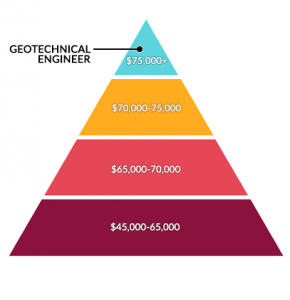About Geotheta

A geotechnical designer is a specialized civil engineer who concentrates on the habits of dirt, rock, and other products found underneath the Earth's surface. They use scientific principles and design methods to analyze the residential properties and behavior of these materials to sustain the safe and effective layout, building and construction, and maintenance of framework tasks.
They conduct site investigations, gather examples, carry out research laboratory tests, and assess data to assess the viability of the ground for construction jobs - Geo Tech Engineer. Based upon their findings, geotechnical designers provide recommendations for structure design, slope security, retaining frameworks, and reduction of geotechnical threats. They team up with various other specialists, such as engineers, structural engineers, and building teams, to make sure that geotechnical factors to consider are incorporated right into the general job style and application
By assessing the behavior and properties of dirt and rock, they can identify prospective geotechnical risks such as landslides, soil settlement, or slope instability. Their expertise aids stop failures or accidents that might threaten lives and residential or commercial property. Here are some detailed duties and obligations of a geotechnical engineer: Website Examination: Geotechnical engineers conduct website examinations to gather data on subsurface conditions.
They analyze the information to comprehend the buildings and actions of the dirt and rock, including their stamina, permeability, compaction attributes, and groundwater problems. Geotechnical Evaluation and Design: Geotechnical engineers analyze the data gathered during website examinations to analyze the security and viability of the site for construction projects. They perform geotechnical computations and modeling to review aspects such as bearing capacity, settlement, slope stability, lateral planet stress, and groundwater flow.
Our Geotheta Diaries
Structure Design: Geotechnical designers play a critical function in designing structures that can securely sustain the designated framework. They evaluate the dirt conditions and load demands to establish the proper foundation kind, such as superficial foundations (e.g., grounds), deep foundations (e.g (https://www.pubpub.org/user/ian-hammond)., heaps), or specialized strategies like dirt enhancement. They think about elements such as negotiation restrictions, bearing ability, and soil-structure interaction to create ideal foundation designs
They examine building plans, monitor website activities, and perform area evaluations to validate that the style recommendations are complied with. If unforeseen geotechnical concerns develop, they assess the scenario and supply suggestions for remediation or changes to the design. Risk Evaluation and Reduction: Geotechnical engineers assess geotechnical dangers and risks connected with the project site, such as landslides, liquefaction, or dirt disintegration.

Cooperation and Interaction: Geotechnical engineers function carefully with various other professionals associated with a job, such as engineers, structural engineers, and building and construction teams. Reliable communication and collaboration are vital to integrate geotechnical considerations right into the general task style and construction process. Geotechnical designers supply technological proficiency, response queries, and ensure that geotechnical demands are met.
A Biased View of Geotheta
Here are some kinds of geotechnical designers: Foundation Engineer: Foundation engineers focus on creating and analyzing foundations for structures. They analyze the dirt problems, load requirements, and website qualities to figure out one of the most proper structure kind and style, such as superficial foundations, deep structures, or specialized methods like heap structures.
They review the factors influencing incline security, such as dirt properties, groundwater problems, and incline geometry, and create approaches to prevent slope failings and mitigate dangers. Earthquake Engineer: Earthquake engineers focus on evaluating and creating frameworks to withstand seismic forces. They evaluate the seismic risk of a site, evaluate dirt liquefaction capacity, and establish seismic style requirements to guarantee the safety and resilience of frameworks during quakes.
They carry out area screening, collect examples, and examine the collected data to identify the soil buildings, geologic developments, and groundwater problems at a site. Geotechnical Instrumentation Designer: Geotechnical instrumentation designers concentrate on monitoring and gauging the habits of soil, rock, and structures. They mount and preserve instrumentation systems that check factors such as dirt negotiation, groundwater levels, incline motions, and structural variations to evaluate performance and supply early cautions of prospective concerns.
Get This Report on Geotheta
They tend to be investigative people, which implies they're intellectual, reflective, and curious. They are curious, methodical, logical, analytical, and sensible. Several of them are also social, indicating they're kind, charitable, cooperative, person, caring, useful, compassionate, skillful, and pleasant. Does this seem like you? Take our cost-free career test to discover out if geotechnical designer is among your leading occupation suits.
In the office atmosphere, geotechnical engineers use specialized software application tools to carry out calculations, develop styles, and analyze data. They prepare records, evaluation job specifications, communicate with customers and staff member, and coordinate job activities. The office setup offers a conducive environment for study, analysis, and collaboration with various other experts associated with the job.
Geotheta Fundamentals Explained
They regularly see job websites to conduct website investigations, evaluate geotechnical conditions, and gather data for analysis. These brows through include taking a trip to various places, in some cases in remote or challenging surfaces. Geotechnical designers may you can try this out execute soil sampling, conduct examinations, and display building tasks to guarantee that the geotechnical facets of the project are being carried out correctly.
Geotechnical designers also operate in specialized geotechnical research laboratories. In these facilities, they carry out experiments, execute tests on soil and rock examples, and analyze the engineering properties of the materials. Geotechnical lab designers function extensively in these atmospheres, managing screening equipment, running tools, and videotaping data. They work together with various other research laboratory personnel to make certain accurate and trustworthy screening outcomes.
Comments on “Excitement About Geotheta”